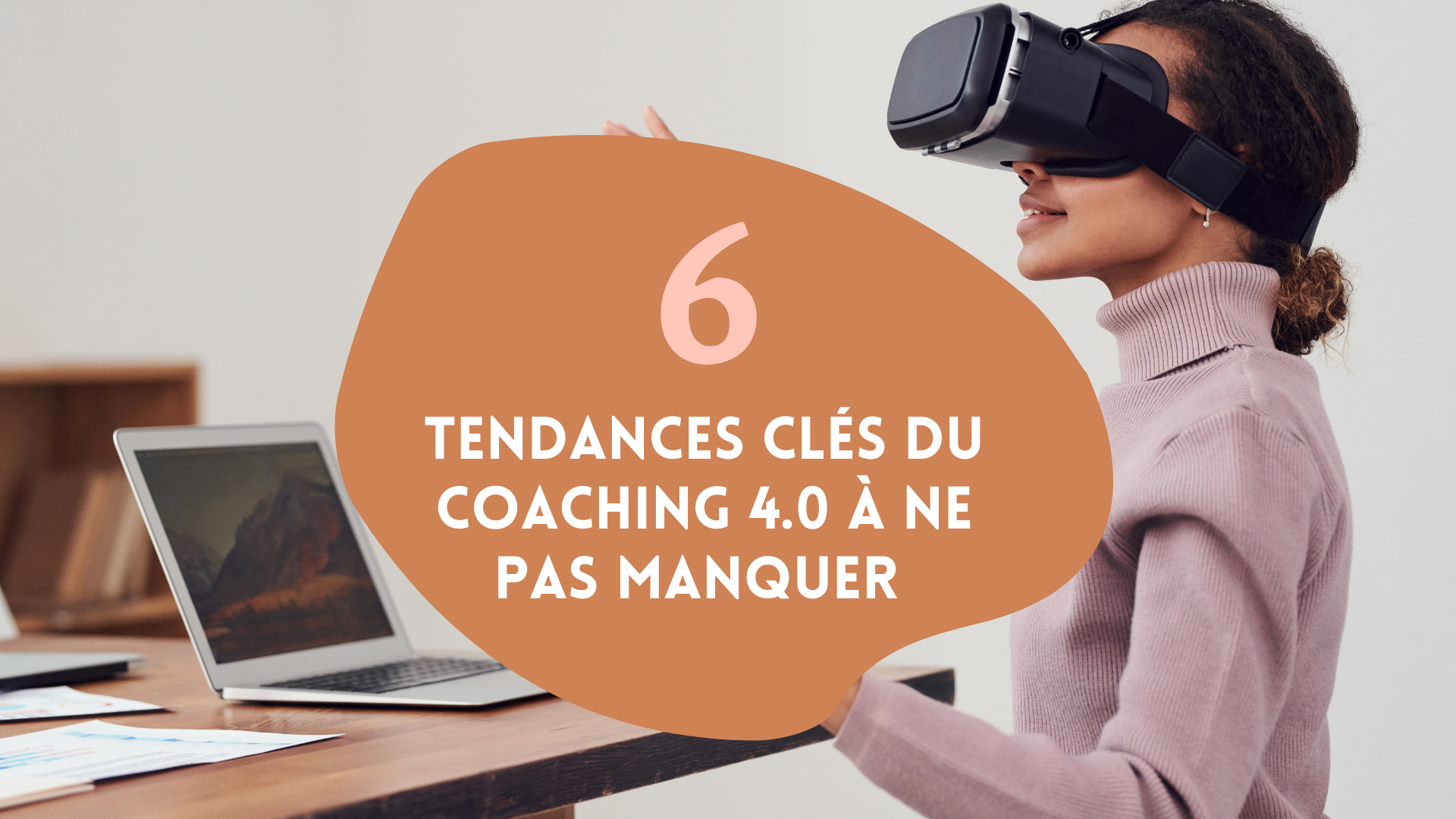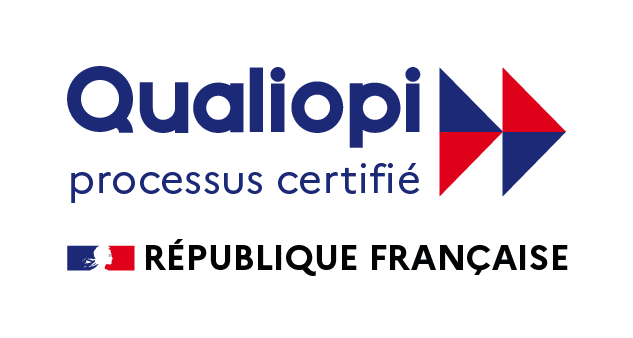The future of coaching: 6 key trends not to be missed!
Coaching is now a well-established practice, including in France, even if it remains less developed than in Anglo-Saxon countries. A real tool in the arsenal of “learning and development” available to learning companies, coaching is evolving and becoming increasingly democratic in order to adapt to the new challenges of a changing and uncertain world. Numerous individuals and organizations are turning to coaching to solve both one-off problems and long-term issues. The health crisis has given rise to new expectations, with a strong desire for individuals to refocus on themselves, to get to know themselves better, and to improve their performance and well-being over the medium and long term.
Coaching has thus accelerated the evolution of practices, and new trends are emerging to support the human accompaniment of tomorrow, which is central to the ‘future of work’, as highlighted by the World Economic Forum. Here’s a quick look at the new post-COVID demands, and the innovations that are already making their mark and will be at the heart of the coaching offering of the future!
New needs for leaders and their organizations
The world has changed dramatically in recent years. The digital revolution, globalization and various crises have taught us to adapt quickly to this unpredictable world. In the workplace, we speak of a VUCA world, a volatile, uncertain, complex and ambiguous environment in which world values are changing. Companies are rethinking the way they operate, and implementing new approaches to support their teams in new ways.
New skills and behaviors are needed to manage these new challenges. As a result, there is an accelerating demand for corporate coaching (+20% for large companies), SERENITY COACH INSTITUTE) [1]. As the health crisis has had a major impact on their employees’ mental health and performance – a 9-point drop in creativity, a 7-point drop in mental flexibility, a 7-point drop in meaning in their lives (OPEN MIND IMPACT STUDY) [2] – companies are becoming aware of the importance of supporting their employees towards a new work dynamic, taking into account their well-being, their values, their raison d’être and the development of their potential.
As a result, new topics are gaining in importance, such as leadership development, which accounts for 30% of coaching requests (2020 ICF-PWC STUDY) [3]. Today’s leaders need to possess a wide range of emotional, cognitive and social skills (authenticity, communication, flexibility, agility, creativity, etc.), which are essential not only to the well-being of their teams, but also to the transformation of their company.
Céline Bedell, certified professional coach and member of the coaching and outplacement practice Version OriginaleCéline Bedell, a certified professional coach and member of the coaching and outplacement firm Version Originale, is seeing an increasing number of requests from her customers to support recent changes in managerial practices in the wake of the health crisis: “Learning to better manage your energy and emotions” or “Adapting in a complex environment with a positive and lasting impact” (see interview). Corporate clients are asking coaches to work closely with them on profound issues of well-being at work and performance, within ever tighter deadlines.
Consequently, faced with these new, ever more demanding, comprehensive and profound demands, coaching needs to reflect on its practice and reinvent itself. Hitherto untouched by technology and the data revolution, coaching is gradually opening up to a more targeted, efficient and profound practice by undergoing its digital moult.
The digital coaching revolution is underway
The future of coaching is a combination of the human and the technological. It takes place at all levels – head, heart and body – and takes into account the whole person, their emotions, their body and their way of functioning. Here are the 6 key trends in coaching today and in the coming years, both in France and abroad:
1) COACHING FOR ALL
Originally, the coaching market was more reserved for an elite: top managers, high-level executives. Today, it’s aimed at a wider range of people (more positions, broader age range). Companies have realized the benefits of coaching at all levels: developing employees’ skills, remobilizing teams, improving management, strengthening emotional bonds.
The rapid democratization of coaching is due in part to the emergence of new tools such as platforms and videoconferencing, making coaching accessible to everyone, from anywhere and at lower cost. As an American view of recent coaching trends notes, coaching is also massively expanding towards the ‘millennial’ populations, who are very keen on feedback and value coaching opportunities in their companies [4].
While this trend is a positive one for the future of coaching, it also poses some real challenges: what new offerings are needed to support more people without skyrocketing costs? How can we effectively support new, more emotional skills?
2) THE NEW STANDARD: HYBRID AND DISTANCE COACHING
The advent of digital technology has revolutionized all areas of business, including human support and skills development. The health crisis has accelerated the emergence of new solutions such as the coaching platforms mentioned above, and video-conferencing training. According to the ICF 2021 study COVID-19 and the Coaching Industry [5], coaching via video/audio platforms has increased by 88% in Europe since the start of the pandemic.
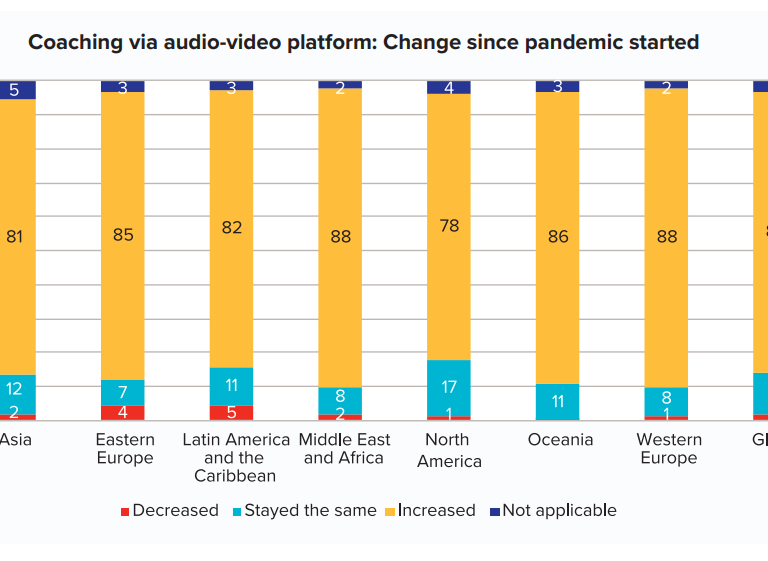
Even if the human element is at the heart of the process, digital technology makes it easier to access. And it’s a trend that’s not about to weaken, as almost 9/10 coaching professionals (87%) believe that the future of coaching will be found virtually at a higher rate in the long term.
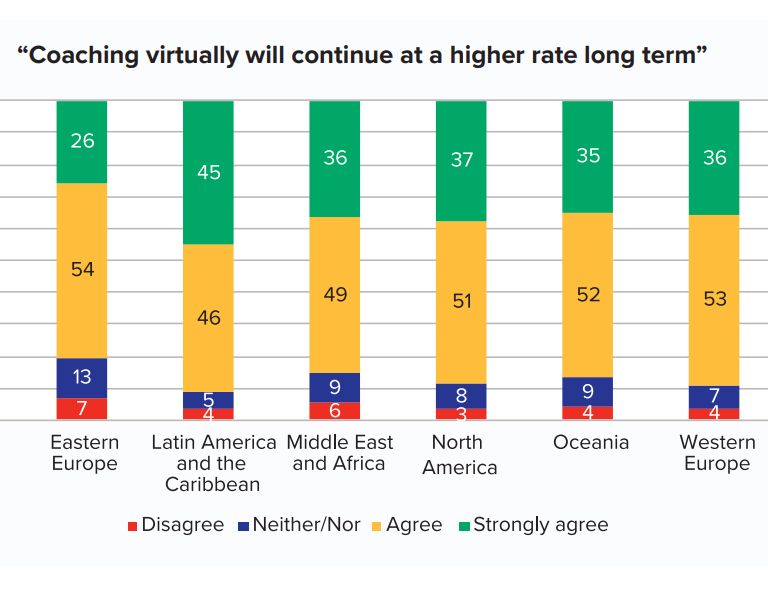
3) SHORTER, FASTER-IMPACT FORMATS
The accelerating pace of change and the democratization of coaching have resulted in a growing demand for flash coaching. According to Olivier Leroycoach at Version Originale, companies and employees are looking for short training programs, often consisting of 3-4 sessions, to “help their staff get through a particular phase”, by working on specific points. The desired result: faster change at lower cost.
To deliver this result, coaches are looking for tools to multiply the impact of their sessions. We can thus observe a convergence between coaching 4.0 and training 4.0, which in recent years has seen the emergence of tools for more nomadic, à la carte and personalized learning [6]. As a result, coaching is increasingly being integrated and articulated with other “learning and development” tools. This is once again underlined by an American studyThis is once again underlined by an American study, which notes that “coaching will increasingly be integrated into leadership development programs, or offered as a complement to them” [4]. At the same time, the tools available to the coach are gradually being expanded, as the coach’s armament between two sessions or after a flash program. Hence the emergence of content that complements coaching: webinars, videos, podcasts, articles, e-books. This virtual dimension added to physical coaching enables coaches to deepen their value and coachees to increase the impact of their learning.
Although it is difficult for individual coaches to equip themselves and develop their own content, applications, etc. due to their often individual or small practice, this trend towards integrated offerings opens the way to new associations between coaches, via coaching platforms or through the use of advanced tools such as the Open Mind Neurotechnologies suite for coaches who wish to retain their independence.
4) THE METAVERSE REVOLUTION OR IMMERSIVE COACHING
No one can escape the tidal wave of metavers, which is also calling into question the practice of coaching. As in other areas of learning, the development of virtual environments presents a host of numerous opportunitiesThis is because they enable experiential learning, which is recognized as the most effective learning practice compared to more theoretical teaching.
Indeed, as well as stimulating a high level of concentration in the learner, virtual reality saves considerable time and money, as learning can be repeated as many times as necessary, with real-time feedback on the learner’s actions. The learner can thus correct mistakes and internalize best practices.
In addition, as part of the many corporate reflections on the employee experience, attractive and innovative learning environments are a real plus, also valued for this ’employer brand’ dimension.
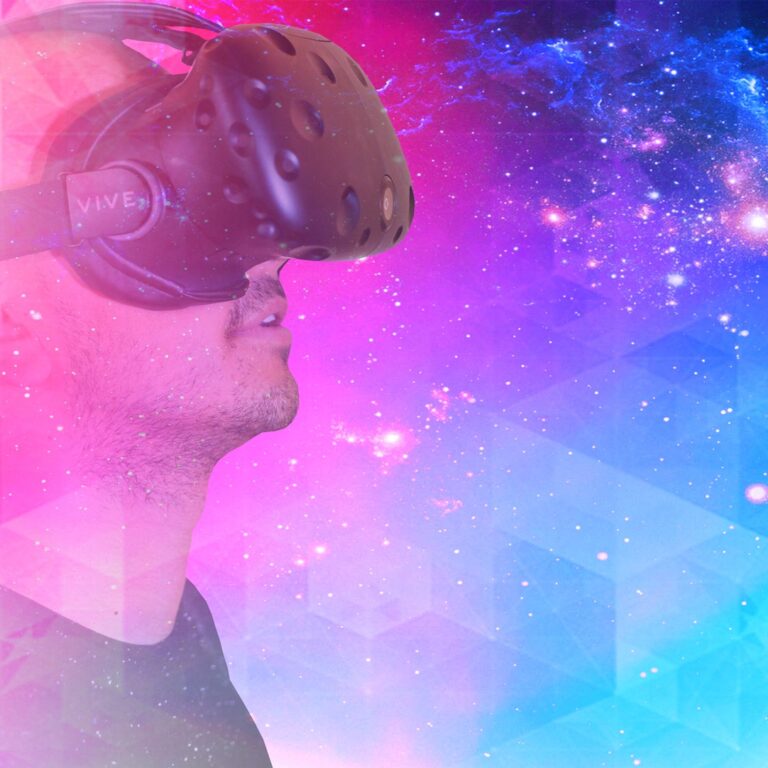
5) NEUROSCIENCE FOR MEASURABLE IMPACT
If there’s one dimension in which coaching still pales into insignificance, it’s its connection with the environment and scientific research. The MBTI tool, for example, still the leading psychometric assessment tool prior to coaching, dates back to… 1962! And today, it is neither used nor recognized in research. Over the last two decades, neuroscience and psychology research has made a great leap forward in terms of detailed and measurable knowledge of cognitive and emotional functions.
Dimensional approaches, such as those put forward by the NIMH, the American mental health institute, entitled “Research Domain Criteria” RDoC, represent a major advance for development, in a holistic approach to the human being. Combined with advances in data science, they pave the way for recommendations that are far more personalized and focused on measurable impacts than dimensional mapping by letter or color, which also “essentializes” individuals.
Another major opportunity offered by neuroscience for human development in the workplace is to complement psychometric analyses based on questionnaires, which today dominate coaching. A simple search on PubMed, the reference tool for all scientific publications on the subject, reveals that over 10,000 publications since 2000 deal with situation-based assessment protocols for key cognitive and emotional functions, many of them totalling hundreds of publications. Thanks to our knowledge of the autonomic nervous system, it is now possible to isolate markers of competence measured by physiological, behavioral or even brain imaging indicators.
To meet the challenge of developing skills on a mass scale, while maintaining constant resources, these proven diagnostic and measurement capabilities represent a major opportunity, as long as we can develop ecological environments through games or virtual situations that reproduce laboratory conditions.
6) TEAM COACHING AT THE HEART OF VALUE
There is a growing demand for team coaching, which is also once again highlighted by experts across the Atlantic as an underlying trend [4]. With the health crisis, companies need more than ever to remobilize their teams, establish a virtuous collective dynamic and develop their corporate culture. The aim here is to set up coaching using collective tools that will enable the individual to interact with his or her external environment (manager, team), so as to work on key skills such as connecting with others, cooperation and collective intelligence.
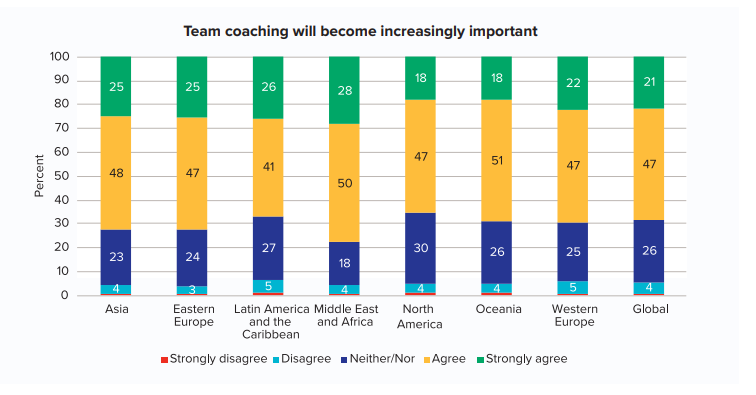
70% of coaches in Europe expect team coaching to become increasingly important (2021 COVID-19 and the Coaching IndustryICF study) [5].
While this trend is totally consistent with advances in research, which emphasize the importance of psychological safety and collective intelligence as the best predictors of performance, it does pose a few challenges for coaches. For accompanying a group is always more unpredictable, prompting coaches to enter into partnerships over several team meetings in order to have a much more tangible impact. The underlying trend is therefore for a coach to need diagnostic data that enables in-depth dialogue on team dynamics in complete psychological safety, and tangible impact data for a progressive journey towards the desired goal.
The future of coaching as you dreamed it
The practice of coaching continues to evolve, with the emergence of new needs, new approaches and new solutions. It plays a major role at all levels (organizations, teams, leaders and, more broadly, society), and will continue to reinvent itself to meet the challenges of the future. We only need to look at other related fields of activity at the heart of the human experience to be convinced that it’s only a matter of time – for example, the development of 4P medicine (preventive, personalized, predictive, participative) or the rapid evolution of training and education.
In line with these 6 fundamental trends in the future of coaching, Open Mind Neurotechnologies™ aims to provide the tools for individual and team coaching to make its digital moult. It represents the new generation of scientific and experiential tools for coaches and psychologists to support them in developing new skills, faster and measurably.
Based on neuroscience, serious games and virtual reality, these tools enrich coaching by providing coaches with scientific data on which to base their awareness-building and personalized support. They also enable the impact of coaching to be quantified. Example of the impact of Open Mind coaching: +19% in commitment, -16% in anxiety, +20% in emotional bonding(Open Mind data, n=190)
“Today’s Open Mind Neurotechnologies™ tools are already propelling me into tomorrow’s coaching, providing concrete answers based on scientific data. This enables the realization of psychological triggers, and thus give optimal results by removing the obstacles to one’s success (whatever they may be).” – Pierre-Arnaud SY, certified professional coach (read interview)
“These are powerful tools for raising awareness. The explanations given by neuroscientists, coupled with the structure of the tool, provide a reassuring and helpful diagnostic readability for the client. As a result, the coaching work can begin more quickly, in a positive and constructive climate, with a focus on solutions and well-being”. – Karine Fabiani, certified professional coach (read interview)

References :
[1] 2021 Market study of the professional coaching profession, SERENITY COACH INSTITUTE
[2] 2021 Impact study: the body & emotions at the heart of post-COVID performance, Open Mind Neurotechnologies™
[3] 2020 ICF Global Coaching Study in collaboration with PricewaterhouseCoopers (PwC)
[4]https://www.flashpointleadership.com/blog/the-future-of-coaching-what-do-the-experts-say
[5] 2021 COVID-19 and the Coaching Industry Snapshot Survey, ICF
[6] 2020 KPMG “Future of learning” Report
